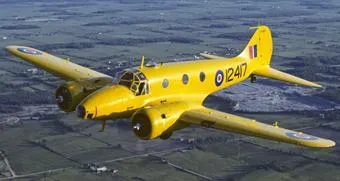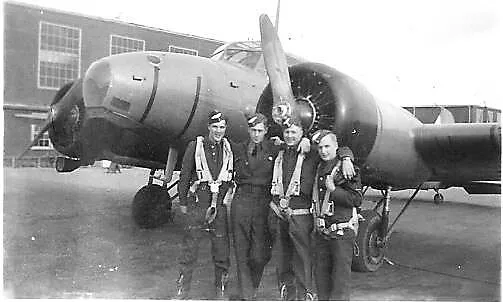Bell, James Colin (Leading Aircraftman)
Killed in Flying Accident 1943-February-05


Birth Date: 1910
Born:
Parents: Leo James Bell & Margaret Bell (nee Milligan), of Inangahua Landing, Nelson, New Zealand
Spouse: Rita Bell, of Hamilton, Auckland, New Zealand.
Home: Auckland, New Zealand
Enlistment:
Enlistment Date: unkown date
Service
RNZAF
Unit
9 AOS- Air Observer School
Base
RCAF Stn. St Jean, Quebec
Rank
Leading Aircraftman
Position
Service Numbers
422580
This incident involved multiple aircraft:
- Anson Mk. I Serial: 6196
- Anson Mk. I Serial: 6650
All the above aircraft in the above list are referenced in this report.
Crew or Other Personnel
Anson 6650
Accident Card - Avro Anson Mk. I serial:6650
This accident involved 2 aircraft on 1943-February-05. They are: Anson I s/n 6650, Anson I s/n 6196.
This accident involved 5 people. Bell JC, Bowler JT, Crump ER, Still D, Windsor AD
This accident had 5 fatalities. Leading Aircraftman John Thomas Bowler RAFVR Killed in Flying Accident service no:1355815 Anson 6650, Leading Aircraftman James Colin Bell RNZAF Killed in Flying Accident service no:422580 Anson 6650, Civilian Donald Still Civilian Killed in Flying Accident service no: Anson 6650, Civilian Andrew Darius Windsor Civilian Killed in Flying Accident service no: Anson 6650,Leading Aircraftman Edward Reginald Crump RCAF Killed in Flying Accident service no:R/142171 Anson 6196
Anson serial: 6650

Canadian Warplane Heritage Museum
The Museum's Anson Mk. V was built by MacDonald Brothers in Winnipeg in 1944. It flew with No. 7 Photographic Wing and No. 414 Squadron in Ottawa on photo survey work until the late 1940s. In 1956, it was purchased by INCO and used for mineral surveying until 1980, when it was donated to the Museum. The exterior is painted in the yellow colour common to all BCATP trainers and is in its same wartime RCAF markings.
The Avro Anson was known by a number of nicknames including "Faithful Annie" or "Flying Greenhouse". It was the first aircraft to be flown by the Royal Canadian Air Force to have a retractable undercarriage, which was a comparative novelty in 1936. In 1940, a Canadian government owned company, Federal Aircraft Limited, was created in Montreal to manufacture the Anson for Canadian use. Nearly 3,000 Anson aircraft were produced and, in the early days of the British Commonwealth Air Training Plan (BCATP), the Anson was the standard trainer for many pilots, observers (navigators), wireless operators and bomb aimers. More than 20,000 aircrew received training on the Anson. In Canadian service, the aircraft was substantially re-designed with the substitution of North American engines and many other airframe and equipment changes. Harold Skaarup web pages
Aircraft Images
Anson 6196
Anson Mk. I 6196
Ex RAF W1632. To No. 3 Training Command on 5 December 1940, for use by No. 8 Service Flying Training School at Moncton, NB. Category C3 damage at Moncton, at 12:15 on 26 January 1941. To Eastern Air Command on 13 November 1941, for use for use by No. 2 Air Navigation School at Pennfield Ridge, NB. Category B crash at Pennfield at 17:35 on 23 March 1942. Collision with Anson 6399 while taxiing. To No. 3 Training Command on 6 June 1942. Crashed on 5 February 1943, three miles south of Chembly, Quebec, possibly collided with Anson 6650. All 4 on board killed, including civilian pilot D. Still; Leading Aircraftman J.T. Bowler, RAF; Leading Aircraftman J.C. Bell, RNZAF; and Leading Aircraftman E.R. Crump.1940-11-12 Taken on Strength Ottawa Car & Aircraft 2019-08-20
1941-January-26 Accident: 8 Service Flying Training School Loc: Moncton New Brunswick Names: House
1942-March-23 Accident: 2 Air Navigation School Loc: Aerodrome Names: Lloyd | Potter | Prest | Soeder
1943-February-05 Accident: 9 Air Observer School Loc: St Luc Names: Bell | Bowler | Crump | Still | Windsor
1943-04-04 Struck off Strength Struck off, reduced to spares and produce by No. 9 Repair Depot 2019-08-20
Anson 6650
Anson Mk. I 6650
Ex RAF W2424. To No. 3 Training Command on 16 July 1941, for use by No. 9 Air Observers School at St. Jean, Quebec. Collided with Anson 6196 on 5 February 1943, three miles south of Chembly, Quebec (which is about 10 miles north of St. Jean). Accident date reported as 20 February 1943 in Griffin, but this does not match RCAF records.1941-06-04 Taken on Strength Ottawa Car & Aircraft 2019-08-20
1943-February-05 Accident: 9 Air Observer School Loc: St Luc Names: Bell | Bowler | Crump | Still | Windsor
1943-04-04 Struck off Strength Struck off, reduced to spares and produce 2019-08-20
Unit Desciption
9 AOS (9 Air Observer School)
Air Observers were later called "navigators". For recruits in this stream, the training path after ITS was 8 weeks at an Air Observer School (AOS), 1 month at a Bombing & Gunnery School, and finally 1 month at a Navigation School. The Air Observer schools were operated by civilians under contract to the RCAF. For example, Nos. 7, 8, and 9 were run by CP Airlines. However, the instructors were RCAF. The basic navigation techniques throughout the war years were dead reckoning and visual pilotage, and the tools were the aeronautical chart, magnetic compass, watch, trip log, pencil, Douglas protractor, and Dalton Navigational Computer. They trained in the Avro Anson.

